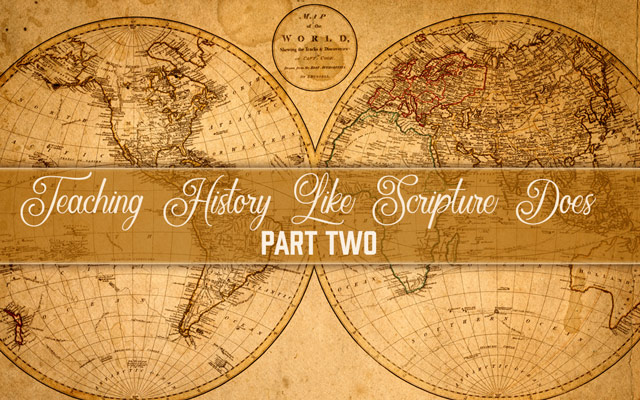Teaching History Like Scripture Does – Part Two


How Scripture Answers Life’s Big Questions?
Ultimately, the quest of history is not to tell us where we have been but where we are going. It does this by answering the three looming questions that burn in every human soul.
1. Is There a God?
2. Why Are We Here?
3. What Is Truth?
Every other question falls under this triune of major questions. What happens when we die hings on why are we here, for if no supernatural cause is the source of our existence, then there is no afterlife because we are the accident of natural causes. We simply cease to be. Likewise, every question we could ask about God presupposes there is a God to ask about. And both God and our reason for being are moot if there is no transcendent truth both God and man are accountable before. To answer these three questions, Scripture gives us three pillar themes for every epoch of history it records.
1. Biblical history has God as the principal character.
2. Biblical history tells the end from the beginning.
3. Biblical history is told through men and women in their relationship to God.
Biblical History Has God as the Principal Character.
God is the I AM Who was and is and is to come. He is the First Cause of all things and in Him all things consist. Without Him was not anything made that was made and from Him are all things both visible and invisible. He is Love, Wisdom, Holiness, Goodness, Righteousness, and Power—all comprised in the Spirit, Whose form is a consuming fire. The voice of His authority is all-powerful, speaking calm to the smallest child or terror to the vilest devil.
In addition to His being, He has a purpose, an agenda from which no power can hinder Him. From before the world began, He has been on a mission, a mission being orchestrated to perfection for the glory of His name and good of His children.
Biblical History Tells the End from the Beginning.
We get no further than the first chapter of Genesis before we see the eternal Godhead of the Father, Son, and Holy Spirit and no further than sin’s curse before we hear sin’s cure; Revelation’s sword-speaking Victor is first promised in Genesis’ garden. Despite the worst of history’s darkest chapters, God spills rays of hope to warm the coldest gloom. To teach history in any other way is to raise a generation who love death rather than life.
Biblical History Is Always in Context of Men and Women’s Obedience to God.
Naturalistic history teaches primarily from the epic event view, while Scripture teaches from the intimate individual view. In fact, the Bible is singular even among its own contemporaries for the details it provides of otherwise obscure persons. Each account is a personal diary of human fellowship or animosity toward God and His Word. If Biblical history is based on these three pillars, can we think that all other studies of history can be any less? And in applying these pillars to history, how can we better learn them than unearthing their supporting columns in the accounts of Adam, Moses, Ruth, David, Habakkuk, Peter, James, Barnabas, John, and of course, Jesus Christ? In the following weeks, we will delve into these Biblical case studies to learn how to practically teach history like Scripture does.
Kenzi Knapp is a follower of Christ, homeschool graduate and student of history. A fourth generation Missourian she enjoys writing about daily life enrolled in Gods great course of faith and His story throughout the ages at her blog, Honey Rock Hills.














































